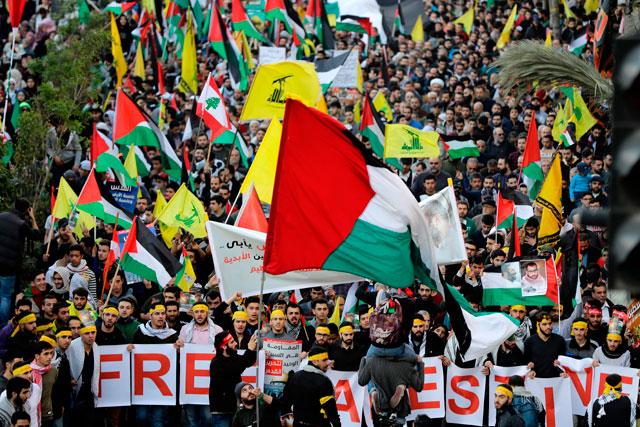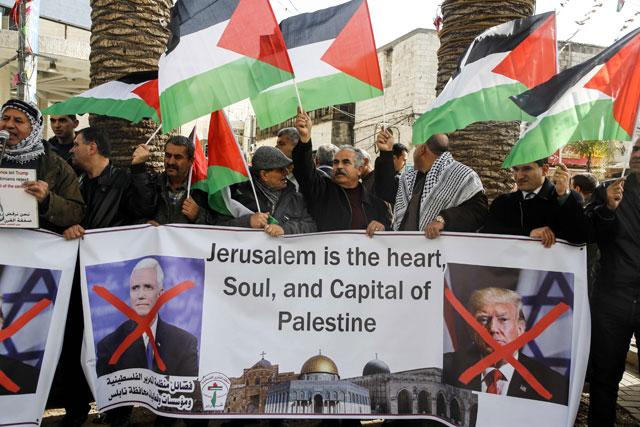You are here
Fifth day of protests in Middle East over Trump’s Jerusalem move
By AFP - Dec 11,2017 - Last updated at Dec 11,2017

Supporters of Lebanon’s Hizbollah Shiite movement wave national Palestinian (front) and Hizbollah’s yellow flags during a massive rally in the Lebanese capital Beirut on Monday to protest US President Donald Trump’s controversial recognition of Jerusalem as Israel’s capital (AFP photo)
OCCUPIED JERUSALEM — A fifth day of angry protests was expected in the Middle East on Monday over US President Donald Trump’s declaration of occupied Jerusalem as Israel’s capital, as Palestinian leader Mahmoud Abbas visited Cairo for crisis talks.
As near universal criticism of Trump’s decision mounted, Israeli Prime Minister Benjamin Netanyahu held talks with EU foreign ministers in Brussels, declaring that the move he has lauded as historic “makes peace possible”.
But further protests were being planned for Lebanon and Iran as well as in East Jerusalem and the Palestinian territories.
Hizbollah, which fought a war with Israel in 2006, called for the demonstration in Beirut’s southern suburbs, with large crowds and a speech by the Shiite group’s leader Sayyed Hassan Nasrallah expected in the afternoon.
A large turnout was also expected for a protest in Tehran.
Iranian President Hassan Rouhani said on Sunday that Trump’s decision threw “fuel on the fire” of Middle Eastern tensions and would not be tolerated.
A protest was being organised in the afternoon in front of a US cultural centre in East Jerusalem, while another was planned for Bethlehem in the occupied West Bank.
In Ramallah on Monday, dozens of Palestinians threw stones at Israeli soldiers in the latest such clash.
Palestinian demonstrations have declined in number and intensity since reaching a peak on Friday, but there are concerns they will again increase later this week.
Four Palestinians have so far been killed in clashes or Israeli air strikes in response to rocket fire from Gaza, while hundreds have been wounded.
Tens of thousands have also demonstrated in a range of Middle Eastern and Muslim nations.
‘Rejected and denounced’
Palestinian leaders have been outraged by Trump’s move, but they also face difficult choices in how to respond since they rely on US aid and would like to salvage remaining hopes of a two-state solution to the conflict.
Abbas will refuse to meet with US Vice President Mike Pence when he visits the region later this month, Palestinian officials say, a move that led Washington to accuse the Palestinian leader of “walking away” from a chance to discuss peace.
“Our message to the entire world is that Jerusalem is a Palestinian city and the US decision is rejected and denounced,” Abbas spokesman Nabil Abu Rudeina said, quoted by official news agency WAFA.
“What is required now are bold Palestinian and Arab decisions for the coming stage, which is very important and very critical. The Palestinians and Arabs should stand together.”
Netanyahu, who has been dogged by corruption investigations against him at home, has lauded the US president’s declaration and called for other countries to follow suit.
On Monday, he was in Brussels as part of a two-day trip to Europe after having met French President Emmanuel Macron in Paris the previous day, with the visits having been planned before Trump’s declaration.
Macron urged Netanyahu to “show courage” and take measures to restart long-stalled Israeli-Palestinian peace efforts, including freezing settlement construction in the West Bank.
Netanyahu, who heads what is seen as the most right-wing government in Israeli history, showed no sign of obliging, instead seeking to place blame on the Palestinians for stalled peace efforts.
He met EU foreign ministers in Brussels on Monday, the first such talks with an Israeli premier in 22 years and after the bloc’s diplomatic chief Federica Mogherini warned Trump’s move could take the situation “backwards to even darker times”.
Netanyahu had a starkly different view.
“It doesn’t obviate peace, it makes peace possible, because recognising reality is the substance of peace, it’s the foundation of peace,” Netanyahu said alongside Mogherini.
Mogherini said the “worst thing that can happen now is an escalation of tensions, of violence” and restated the EU’s position that a two-state solution with Jerusalem as capital for both Israelis and Palestinians was the only sustainable way to resolve the conflict.
Global condemnation
Trump’s Jerusalem declaration upended decades of precedent and broke with international consensus, drawing global condemnation.
Jerusalem’s status is perhaps the most sensitive issue in the Israeli-Palestinian conflict.
Israel sees the entire city as its undivided capital, while the Palestinians want the eastern sector as the capital of their future state.
Trump noted in his decision that Jerusalem’s final status would have to be decided in negotiations between the two sides, but the Palestinians have not been convinced.
Many analysts have questioned how a fair peace process could be possible with such a major concession without seeming to demand anything in return.
Jerusalem is also home to sites sacred to Jews, Christians and Muslims, and the Arab and Muslim world has seen it as an afront.
Turkish President Recep Tayyip Erdogan has been perhaps the most outspoken in warning over the consequences of the move, while on Sunday he lashed out by calling Israel a “terrorist state” that “kills children”.
Netanyahu hit back, calling Erdogan a leader who “bombs Kurdish villagers” and “helps terrorists”.
Related Articles
OCCUPIED JERUSALEM — New protests flared in the Middle East and elsewhere Sunday over US President Donald Trump’s declaration of Jerusalem a
OCCUPIED JERUSALEM/BRUSSELS — In a fresh display of Western discord over Middle East peace efforts, the United States said on Monday its Isr
AMMAN/BRUSSELS — EU foreign policy chief Federica Mogherini on Thursday urged support for His Majesty King Abdullah as the custodian of Jeru


















